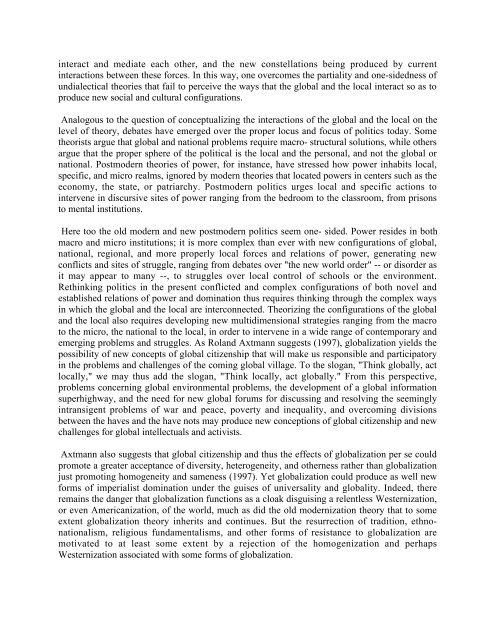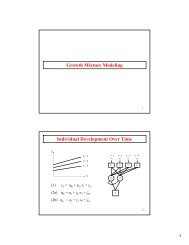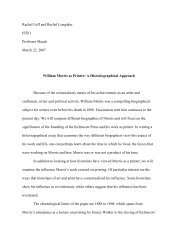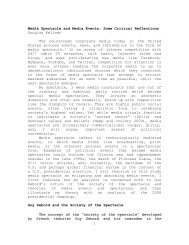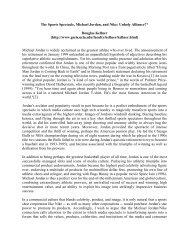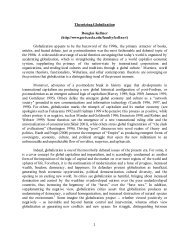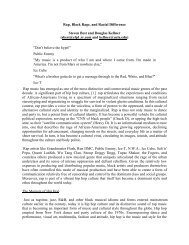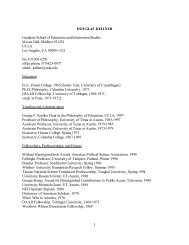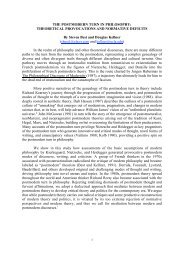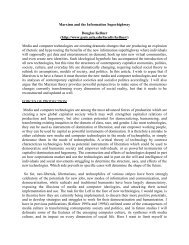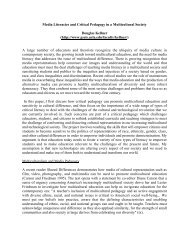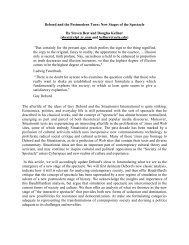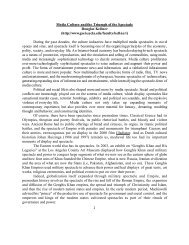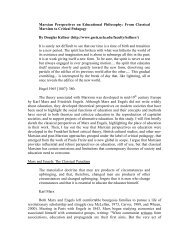Globalization and the Postmodern Turn By Douglas Kellner ... - UCLA
Globalization and the Postmodern Turn By Douglas Kellner ... - UCLA
Globalization and the Postmodern Turn By Douglas Kellner ... - UCLA
You also want an ePaper? Increase the reach of your titles
YUMPU automatically turns print PDFs into web optimized ePapers that Google loves.
interact <strong>and</strong> mediate each o<strong>the</strong>r, <strong>and</strong> <strong>the</strong> new constellations being produced by current<br />
interactions between <strong>the</strong>se forces. In this way, one overcomes <strong>the</strong> partiality <strong>and</strong> one-sidedness of<br />
undialectical <strong>the</strong>ories that fail to perceive <strong>the</strong> ways that <strong>the</strong> global <strong>and</strong> <strong>the</strong> local interact so as to<br />
produce new social <strong>and</strong> cultural configurations.<br />
Analogous to <strong>the</strong> question of conceptualizing <strong>the</strong> interactions of <strong>the</strong> global <strong>and</strong> <strong>the</strong> local on <strong>the</strong><br />
level of <strong>the</strong>ory, debates have emerged over <strong>the</strong> proper locus <strong>and</strong> focus of politics today. Some<br />
<strong>the</strong>orists argue that global <strong>and</strong> national problems require macro- structural solutions, while o<strong>the</strong>rs<br />
argue that <strong>the</strong> proper sphere of <strong>the</strong> political is <strong>the</strong> local <strong>and</strong> <strong>the</strong> personal, <strong>and</strong> not <strong>the</strong> global or<br />
national. <strong>Postmodern</strong> <strong>the</strong>ories of power, for instance, have stressed how power inhabits local,<br />
specific, <strong>and</strong> micro realms, ignored by modern <strong>the</strong>ories that located powers in centers such as <strong>the</strong><br />
economy, <strong>the</strong> state, or patriarchy. <strong>Postmodern</strong> politics urges local <strong>and</strong> specific actions to<br />
intervene in discursive sites of power ranging from <strong>the</strong> bedroom to <strong>the</strong> classroom, from prisons<br />
to mental institutions.<br />
Here too <strong>the</strong> old modern <strong>and</strong> new postmodern politics seem one- sided. Power resides in both<br />
macro <strong>and</strong> micro institutions; it is more complex than ever with new configurations of global,<br />
national, regional, <strong>and</strong> more properly local forces <strong>and</strong> relations of power, generating new<br />
conflicts <strong>and</strong> sites of struggle, ranging from debates over "<strong>the</strong> new world order" -- or disorder as<br />
it may appear to many --, to struggles over local control of schools or <strong>the</strong> environment.<br />
Rethinking politics in <strong>the</strong> present conflicted <strong>and</strong> complex configurations of both novel <strong>and</strong><br />
established relations of power <strong>and</strong> domination thus requires thinking through <strong>the</strong> complex ways<br />
in which <strong>the</strong> global <strong>and</strong> <strong>the</strong> local are interconnected. Theorizing <strong>the</strong> configurations of <strong>the</strong> global<br />
<strong>and</strong> <strong>the</strong> local also requires developing new multidimensional strategies ranging from <strong>the</strong> macro<br />
to <strong>the</strong> micro, <strong>the</strong> national to <strong>the</strong> local, in order to intervene in a wide range of contemporary <strong>and</strong><br />
emerging problems <strong>and</strong> struggles. As Rol<strong>and</strong> Axtmann suggests (1997), globalization yields <strong>the</strong><br />
possibility of new concepts of global citizenship that will make us responsible <strong>and</strong> participatory<br />
in <strong>the</strong> problems <strong>and</strong> challenges of <strong>the</strong> coming global village. To <strong>the</strong> slogan, "Think globally, act<br />
locally," we may thus add <strong>the</strong> slogan, "Think locally, act globally." From this perspective,<br />
problems concerning global environmental problems, <strong>the</strong> development of a global information<br />
superhighway, <strong>and</strong> <strong>the</strong> need for new global forums for discussing <strong>and</strong> resolving <strong>the</strong> seemingly<br />
intransigent problems of war <strong>and</strong> peace, poverty <strong>and</strong> inequality, <strong>and</strong> overcoming divisions<br />
between <strong>the</strong> haves <strong>and</strong> <strong>the</strong> have nots may produce new conceptions of global citizenship <strong>and</strong> new<br />
challenges for global intellectuals <strong>and</strong> activists.<br />
Axtmann also suggests that global citizenship <strong>and</strong> thus <strong>the</strong> effects of globalization per se could<br />
promote a greater acceptance of diversity, heterogeneity, <strong>and</strong> o<strong>the</strong>rness ra<strong>the</strong>r than globalization<br />
just promoting homogeneity <strong>and</strong> sameness (1997). Yet globalization could produce as well new<br />
forms of imperialist domination under <strong>the</strong> guises of universality <strong>and</strong> globality. Indeed, <strong>the</strong>re<br />
remains <strong>the</strong> danger that globalization functions as a cloak disguising a relentless Westernization,<br />
or even Americanization, of <strong>the</strong> world, much as did <strong>the</strong> old modernization <strong>the</strong>ory that to some<br />
extent globalization <strong>the</strong>ory inherits <strong>and</strong> continues. But <strong>the</strong> resurrection of tradition, ethnonationalism,<br />
religious fundamentalisms, <strong>and</strong> o<strong>the</strong>r forms of resistance to globalization are<br />
motivated to at least some extent by a rejection of <strong>the</strong> homogenization <strong>and</strong> perhaps<br />
Westernization associated with some forms of globalization.


